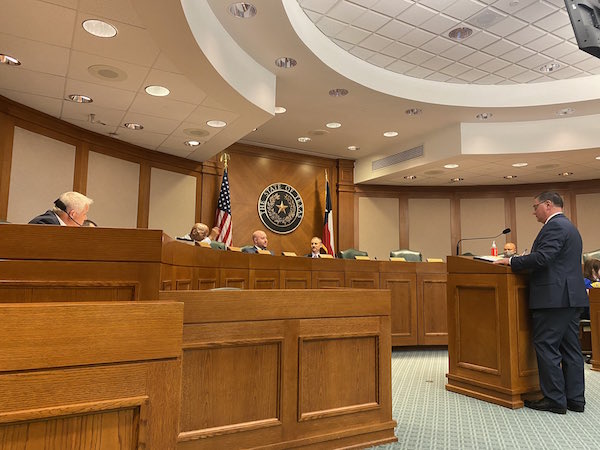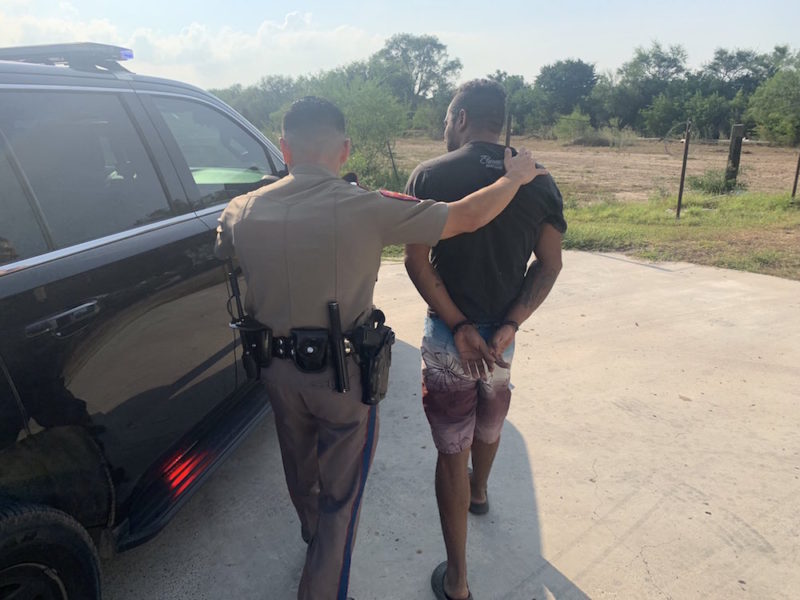Texas has begun to open up more of its expansive state prison system to house migrants arrested on state trespassing charges, an operation that began in July.
Historically, federal authorities have handled immigration enforcement, and state law enforcement lack the legal authority to charge migrants on federal immigration charges.
But Texas hit upon a new legal strategy earlier this year. The state is now arresting migrants who cross into Texas on private ranchland and charging them with trespassing.
To date, the Department of Public Safety has signed agreements with more than 90 ranchers to install surveillance cameras on their property and to authorize DPS operations, according to Lt Col. Freeman Martin, DPS Deputy Director of Homeland Security Operations.
Troopers have arrested about 6,000 migrants on trespassing charges since July. Trespassing in Texas is generally a Class B misdemeanor punishable by up to six months in jail.
Under Operation Lone Star, the new state crackdown, migrants must serve time in jail awaiting trial, unless they can bond out. The idea is that the jail time will serve as a deterrent to stem the near-record tide of border crossings so far this year.
But the border counties lack the jail capacity and the court capacity to handle the caseload of new trespassing cases. Kinney County, for example, has a jail with just 14 beds, yet troopers there have arrested more than 800 migrants in the past month alone.
“Our biggest problem when we surge a bunch of troopers to an area is always the jail capacity,” said Martin, testifying to the House Corrections Committee on Monday. Due to resources constraints, arresting migrants for trespassing “was just not an option” historically, he said.
That’s where the Texas Department of Criminal Justice (TDCJ) has stepped in.
TDCJ emptied out a state prison in Dilley in July, the Dolph Briscoe Unit, and assigned transportation staff to move migrants from the border counties to the facility. “Currently there are 595 detainees at Briscoe,” TDCJ Executive Director Brian Collier testified today.
The department has also opened up two additional facilities in Edinburg, the Segovia Unit and Lopez Unit, and began transferring detainees to the Segovia Unit in mid-September. Currently there are 287 detainees housed in the Segovia Unit, Collier said.
Criminal Justice Committee Chairman Andrew Murr noted that the circumstances of the operation are unusual in that state resources are being used to handle pre-trial services, which normally are handed at the county level. Pre-trail defendants and misdemeanor convicts usually are not housed in TDCJ prisons but in county jails.
In order to convert the Briscoe, Segovia, and Lopez units into jails, TDCJ had to get its staff licensed by the Texas Commission on Jail Standards. It also needed to install air conditioning in the units, since the Jail Standards commission requires that temperatures in its facilities remain below 85 degrees, whereas the state prison system does not.
According to Collier, most of the 882 detainees transferred to the state prisons for border-related offenses are foreign national charged with criminal trespass. A handful are U.S. citizens charged with felonies. “The bulk of them are charged with criminal trespassing but the U.S citizens primarily are charged with smuggling,” said Collier.
The inmates currently in custody hail from Cuba (13), Ecuador (3), El Salvador (28), Haiti (3), Honduras (236), Mexico (506), Nicaragua (14), Congo (1), Venezuela (33), Belize (1), Guatemala (12), and the United States (32).

Rising Number of Arrests
Texas law requires that persons accused of crimes appear before a magistrate within 48 hours to hear the charges against them. So far all of the magistration hearings in Operation Lone Star have taken place in Val Verde. Because the border counties lack sufficient judges to carry out these hearings, Chief Justice Nathan Hecht on July 20 assigned 30 retired judges to assist with magistrating individuals arrested under Operation Lone Star.
After magistration the migrants are taken to Briscoe or Segovia. “Our intention is for them to stay less than 24 hours in Val Verde,” Collier said.
During the August special session, the legislature appropriated funds to the Texas Office of Court Administration to hire court coordinators and interpreters to scale up the pace of the operation. The retired judges have been remotely magistrating an average of 21 persons a day, according to Maria Ramón, acting director of the Office of Court Administration.
Geoff Burkhart of the Texas Indigent Defense Commission said that his agency has given funds to the Lubbock Private Defenders Office to act as the “hub” for indigent defense in the operation, in spite of the fact that Lubbock is hundreds of miles from the border.
There aren’t enough private attorneys in some of the border counties to scale up the capacity of the public defenders offices in those areas, he explained. LPDO is working with 40 private attorneys and two other public defenders office.
“In recent weeks we’ve seen approximately 30 to 40 arrests per day though we’ve heard from the governor’s office it could go up to about 200 arrests per day,” Burkhart said. At that pace, the state would be arresting 73,000 migrants per year. “If we reach that 73,000 arrests per year figure… we would need 250-300 attorneys and additional funds.”
The state’s sprawling prison system has a total system capacity of about 152,000 and it currently houses 118,000 inmates. Collier said that TDCJ is prepared to take more transfers from the border counties but needs to leave some wiggle room for a possible uptick in domestic court activity as COVID-delayed felony trials resume.
“We’re retaining capacity knowing that our courts, as they get back into gear, that our (prison) population will likely increase,” he said.
In the meantime, the Texas Department of Public Safety says it has plenty of resources to scale up Operation Lone Star. The DPS strategy has been to surge resources to areas where it appears the U.S. government isn’t making arrests, according to Martin, the deputy director.
“When you see the number of apprehensions, clearly Border Patrol is overwhelmed,” he said. “Border Patrol is a great partner, they’re just understaffed, they don’t have the resources. They actually have fewer resources than they had in 2013.”
Martin said that in addition to the 6,000 migrants arrested on state trespassing charges so far this year, DPS made over 69,000 apprehensions and referrals to federal authorities.
Democrats Absent
Today’s meeting of the Corrections Committee involved back-and-forth questioning of invited witnesses from state agencies but little in the way of debate among legislators themselves.
Three Democrats serve on the nine-member committee and only one of them showed up to the meeting. Rep. Carl Sherman, Sr., who represents the Dallas suburb of DeSoto, focused his questions and remarks on prison conditions, particularly the climate control systems installed recently in the Briscoe, Segovia, and Lopez units.
Sherman suggested that the prison system should be held to the same standard as the jails. “As it relates to the AC, you mentioned that it was a temporary solution,” he said to TDCJ Executive Director Brian Collier. “I think the issue that we perhaps have here is that while American citizens don’t have AC at all in the prison units, we have put in temporary AC units for individuals who are not citizens…”
“Once we restore those prison units to their purpose of incarcerating Texans, are we going to take out the ACs?”
Collier replied that TDCJ would consider installing air conditioning units in the prisons permanently: “We have been working to identify what it would cost for the long haul.” The agency is currently paying $200,000 a month for diesel generators to power the air conditioners.
The Texas Democrat did not voice criticism of Operation Lone Star itself. At one point he referred to the DPS cooperation with the ranchers as “a very creative way of protecting our private citizens’ property.”
